英语语言学讲义 Lecture 5-semantics
英语语言学Chapter 5_semantics
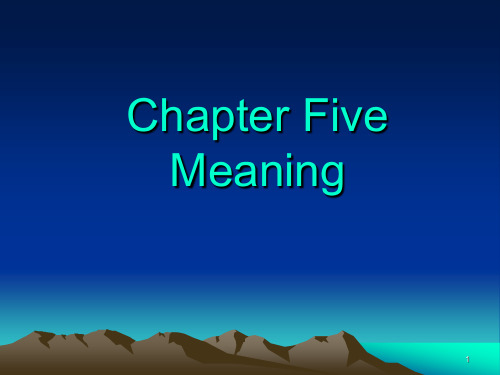
5. Sense & Reference
• Sense and reference are the two terms often encountered in the study of word meaning. They are two related but different aspects of meaning. • Sense– the inherent meaning of the linguistic form. It is the collection of all the features of the linguistic form. • Reference: What a linguistic form refers to in the real, physical world.
18
„Colorful‟ meaning
• Commendatory • tough-minded • resolute, firm • shrewd • childlike • wiseman • man of usual talent • portly, stout, solid, plum • slender, slim • • • • • • • • • Derogatory ruthless obstinate sly, crafty childish wiseguy freak fleshy, fat, tubby lean, skinny, lanky, weedy, scraggy
27
Differences:
• (1) • (2) • (3) linguistic forms having the same sense may have different references in different situations. e.g. I was once bitten by a dog. Mind you. There is a dog over there. Sometimes linguistic forms with the same reference might differ in sense. “朝阳” & “夕阳” “主任” &
unit 5 semantics
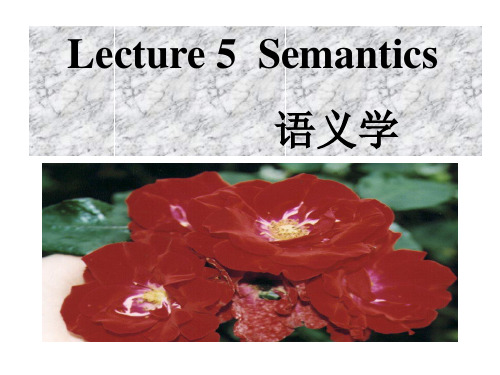
wrath:literature The Grapes of Wrath 《愤怒的葡萄》
John Steinbeck 约翰· 斯坦贝克
• cliche judo
typhoon tea versus ginseng
• Sputnik mosquito
English is particularly rich in synonyms for the historical reason that its vocabulary has come from two different sources, from Anglo -Saxon on the one hand and from French, Latin and Greek on the other.
Wrath
rage
Anger
fury
indignation
“Anger, rage, fury, indignation
and wrath” are synonymous in denoting the emotional excitement induced by intense displeasure.
Sense 意义
Vs versus
Reference 所指
• Sense is concerned with the inherent meaning of the linguistic form. • Abstract • De-contextualized • Dictionary meaning • What does the word “dog” mean in your dictionary?
A teacher was amazed to find that a lazy student had gained • mark a of 100 in an important test.
英语语言学第五章semantics
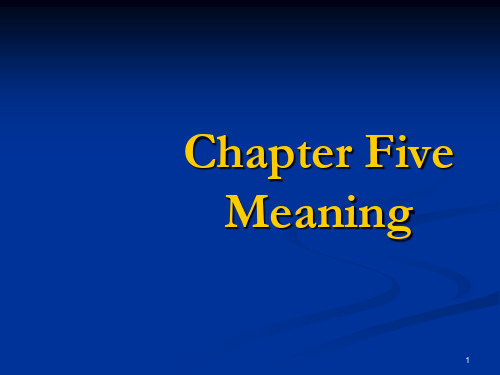
16
6.3 Complementary antonymy
The members of a pair complementary to each other. They divide the whole of a semantic field completely. The assertion of one means the denial of the other and the denial of one means the assertion of the other. There is no intermediate ground between the two. Distinction between gradable and complementary contrary and contradictory
3
3.2 Connotative meaning
the emotional association which a word or a phrase suggests in one’s mind. It is the supplementary value added to the purely denotative meaning of a word. Mother a female parent connotes love, care and tenderness. Dogs have different connotative meaning between Chinese and English.
9
3.7 Thematic meaning
determined by the order of the words and the different prominence they each receive.
英语语言学Lecture 5 Semantics

4.2.3 Converse(反向)~ –E.g. give vs. receive; husband vs. wife.
4.4 Homonymy
Sound Spelling Meaning Example
Concept
word
thing
2.4.2 Sense and Reference
• Sense is concerned with the inherent meaning of linguistic form. It is the collection of all the features of the linguistic form; it is abstract and decontextualized.
1)Innocent—guilty 2)Borrow—lend 3)Strong-weak 4)Furniture—desk 6)Knight—night 7)Autumn—fall
Homophon#43;
Homonym +
+
-
Night vs. Knight
-
Lead vs. Lead
-
Bank vs. Bank
4.5 Hyponymy
Furniture Super-ordinate
Desk
Table
Bed
Co-hyponyms
Exercises
• Tell the sense relations of these pairs of words
• Reference means what a linguistic form refers to in the real, physical world; it deals with the relationship between the linguistic element and the non-linguistic world of experience.
戴语言学5-semantics

5. Semantics5.1 What is semantics?Semantics can be simply defined as the study of meaning. This definition naturally leads to the question: what is meaning? Meaning is central to the study of communication, but the question of what meaning really is is difficult to answer. Even linguists do not agree among themselves as to what meaning is. And what makes the matter even more complicated is th at philosophers, psychologists, and sociologists all claim a deep interest in the study of meaning, although they differ in their focus of interest. The philosophers are interested in understanding the relations between linguistic expressions and what they refer to in the real world, and in evaluating the truth value of linguistic expressions. The psychologists focus their interest on understanding the workings of the human mind through language. This is why it is not surprising to find ten books all bearing the title "Semantics" but talking about different things. In our discussion, we will limit ourselves to the study of meaning from a linguistic point of view.5.2 Some views concerning the study of meaning5.2.1 The naming theoryOne of the oldest notions concerning meaning, and also the most primitive one, was the naming theory proposed by the ancient Greek scholar Plato. According to this theory, the linguistic forms or symbols, in other words, the words used in a language are simply labels of the objects they stand for. So words are just names or labels for things.The limitations of this theory are obvious. First of all, this theory seems applicable to nouns only, but verbs, adjectives, and adverbs such as "think", "hard", "slowly" are definitely not labels of objects. Besides, within the category of nouns, there are nouns which denote things that do not exist in the real world at all such as "ghost", "dragon", and "unicorn", and also nouns that do not refer to physical objects, but abstract notions such as "j o y", "im pulse ".5.2.2 The conceptualist viewA more sophisticated and seemingly more plausible view than naming is one that relates words and things through the mediation of concepts of the mind. This conceptualist view has been held by some philosophers and linguists from ancient times. This view holds that there is no direct link between a linguistic form and what it refers to (i.e. , between language and the real world); rather, in the interpretation of meaning they are linked through the mediation of concepts in the mind. This is best illustrated by the classic semantic triangle or triangle of significance suggested by Ogden and Richards:THOUGHT/REFERENCESYMBOL/FORM-REFERENT(直线表示两者之间有直接联系,虚线表示两者之间无直接联系。
语言学导论-第5章Semantics
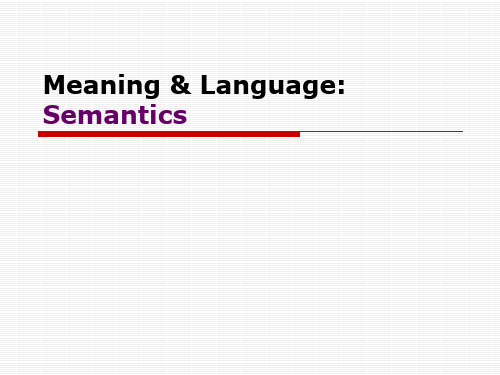
Lexical vs. Compositional Semantics
LEXICAL “man”: COMPOSITIONAL
Dog bites man. (happens all the time; not too interesting) Man bites dog.
2-legged mammal, (relatively) hairless, male sex,
Applicable to Ns only Ns: denote things that do not exist in the real world, e.g. ghost, dragon, unicorn, phenix… Ns: do not refer to abstract notions e.g. joy, impulse, hatred…
The conceptualist view 概念论
a linguistic form
“dog” no direct link what it refers to
Rather, they are linked through the mediation of
concepts in the mind.
The naming theory 命名论 The conceptualist view 概念论 Contextualism 语境论 Behaviorism 行为主义论
The naming theory 命名论
Plato Words are names or labels for things. “whale” “microorganism” Limitations:
Homonymy 同音/同形词
语言学整理的资料Chapter 5 semantics
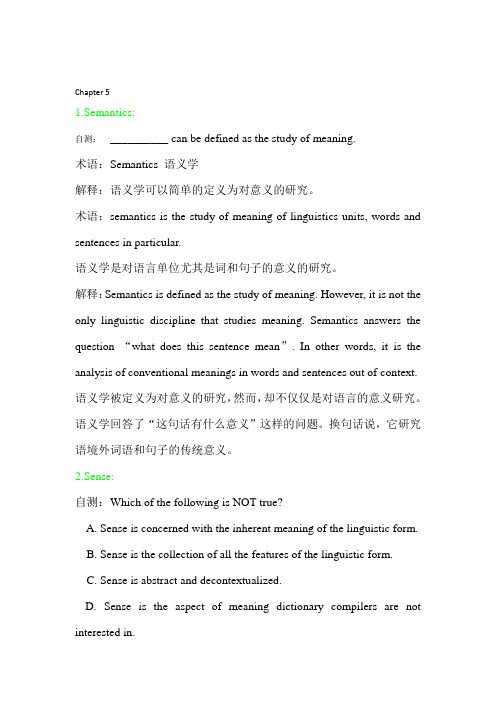
Chapter 51.Semantics:自测: __________ can be defined as the study of meaning.术语:Semantics 语义学解释:语义学可以简单的定义为对意义的研究。
术语:semantics is the study of meaning of linguistics units, words and sentences in particular.语义学是对语言单位尤其是词和句子的意义的研究。
解释:Semantics is defined as the study of meaning. However, it is not the only linguistic discipline that studies meaning. Semantics answers the question “what does this sentence mean”. In other words, it is the analysis of conventional meanings in words and sentences out of context. 语义学被定义为对意义的研究,然而,却不仅仅是对语言的意义研究。
语义学回答了“这句话有什么意义”这样的问题。
换句话说,它研究语境外词语和句子的传统意义。
2.Sense:自测:Which of the following is NOT true?A. Sense is concerned with the inherent meaning of the linguistic form.B. Sense is the collection of all the features of the linguistic form.C. Sense is abstract and decontextualized.D. Sense is the aspect of meaning dictionary compilers are not interested in.术语:Sense 涵义解释:涵义指一个实体的抽象属性。
新编简明英语语言学教程05Chapter5-sema

"up" and "down", "hot" and "cold".
examples
understanding antonyms helps to express contrasts and nuances more accurately.
importance
antonymy
examples
"John opened the door." (John 是动作 "open" 的发起者)
Agency example
Agency
Suffering from trouble
表示遭受某种困难或不幸,通常由动词或动词短语表示。
Suffering from trouble example
"The company is suffering from financial trouble." (公司正在遭受财务困难)
Types of semantic fields
The Application of Semantic Field Theory
Lexicography: Semantic field theory can be used in lexicography to organize and categorize words in dictionaries and thesauri based on their semantic relationships.
01
02
03
04
Point to the matter
05
CHAPTER
Semantic implication and presupposition
- 1、下载文档前请自行甄别文档内容的完整性,平台不提供额外的编辑、内容补充、找答案等附加服务。
- 2、"仅部分预览"的文档,不可在线预览部分如存在完整性等问题,可反馈申请退款(可完整预览的文档不适用该条件!)。
- 3、如文档侵犯您的权益,请联系客服反馈,我们会尽快为您处理(人工客服工作时间:9:00-18:30)。
MeaningWhat is Semantics ? •Semantics -the study ofmeaning oflinguisticunits.•words•sentences•Plato •Lao Zi5.1 The meaning of meaning • C. K. Ogden & I. A. Richards (1923). The Meaning of Meaning.•presented "a representative list of the main definitons which reputable students of meaning have favoured"•16 major categories•22 all together with sub-categories•Geoffrey Leech (1974, 1981). Semantics: The Study of Meaning. Seven types of meaning:1.Conceptual meaning2.Connotative meaning3.Social meaning4.Affective meaning5.Reflected and meaning6.Collocative meaning7.Thematic meaning Associative Meaning5.1.1 Conceptual meaning•Also called ‘denotative’ or‘cognitive’ meaning.•Refers to logical, cognitive or denotative content.•Concerned with the relationship between a word and the thing it denotes, or refers to.5.1.2 Connotative meaning • Philosophical Ideasconnotations "human"-"biped,featherless, rational,etc."- the properties of the entity a word denotes •denotations •John & Maryconnotations • Linguistic Ideas politician vs. statesman -additional, esp. emotive meaning. • Philosophical Ideas "human"- "biped,featherless, rational,etc."- the properties of the entity a word denotes5.1.3 Social meaning•What a piece of language conveys about the social circumstances of its use. •Dialect: the language of a geographical region or of a social class.•Time: the language of the 18th c., etc. •Province: language of law, of science, of advertising, etc.5.1.3 Social meaning•Status: polite, colloquial, slang, etc. •Modality: language of memoranda, lectures, jokes, etc.•Singularity: the style of Dickens, etc.•domicile: very formal, official •residence: formal •abode: poetic •home: general •steed: poetic •horse: general •nag: slang •gee-gee: baby language5.1.4 Affective meaning•Reflecting the personal feelings of the speaker, including his attitude to the listener, or his attitude to something he is talking about.5.1.4 Affective meaning •You’re a vicious tyrant and a villainous reprobate, and I hate you for it!•你这个凶残的土霸王,无耻的色鬼。
我恨透你了!•I’m terribly sorry to interrupt, but I wonder if you would be so kind as to lower your voices a little.or•Will you belt up?5.1.5 Reflected meaning•Arises in cases of multiple conceptual meaning, when one sense of a word forms part of our response to another sense.•When you hear ‘click the mouse twice’, you think of Jerry being hit twice by Tom so you feel excited.•Many taboo terms are result of this.5.1.6 Collocative meaning•The associations a word acquires on account of the meanings of words which tend to occur in its environment. •pretty: girl, boy, woman, flower, garden, colour, village, etc.•handsome: boy, man, car, vessel, overcoat, airliner, typewriter, etc.5.1.7 Thematic meaning•What is communicated by the way in which a speaker or writer organizes the message, in terms of ordering, focus, and emphasis.•Mrs Bessie Smith donated the first prize.•The first prize was donated by Mrs Bessie Smith.•They stopped at the end of the corridor. •At the end of the corridor, they stopped.5.2. Referential theory•Words → Meaning: Words ‘name’ or‘refer to’ things-- Platonic•Words→Concepts→Things: Ogden & Richardsthought/concept/imagesymbolizes refers to symbol -------------------------------------- referent (word) stands for (object)5.2.1 Sense•‘Meaning’ is not some kind of‘entity’ separate from language. •That words ‘have meaning’ means only that they are used in a certain way in a sentence. There is no ‘meaning’beyond the meaning of individual words and sentences.5.2.2Sense vs. Reference •Sense: the way people relate words to each other within the framework of their language•Reference: how language refers to this external worldThe family tree•舅父 = ‘mother’s brother’•叔叔 = ‘father’s younger brother’•伯父 = ‘father’s elder brother’•姨母 = ‘mother’s sister’•姑母 = ‘father’s sister’5.3 Sense Relations•Sense-•Semantic relations between one word and another- between one linguistic unit and another.•Intralinguistic relationsdesk chair table furniture5.3.1 Synonymy•buy/purchase •thrifty/economical/st ingy•autumn/fall•flat/apartment •tube/underground •Sameness relations •Synonyms5.3.2 Antonymy•good ----------------------- bad •long ----------------------- short •big ----------------------- small •Can be modified by adverbs of degree like very.•Can have comparative forms. •Can be asked with how.a. Gradable antonymyb. Complementary antonymy•alive : dead •male : female •present : absent •innocent : guilty •odd : even •pass : fail •boy : girl •hit : missc. Converse antonymy•buy : sell •lend : borrow •give : receive •parent : child •husband : wife •teacher : student •above : below •before : after•host : guest •employer : employee5.3.3 Hyponymy•Inclusiveness•A is included in / a kind of B.•Cf.: chair and furniture, rose and flowerCo-hyponyms & superordinate • flower•• tulip violet roseAnimalbird fish insect animalhuman animaltiger lion elephant ...Hyponymy & Antonymy Beautiful plain looking uglySense Relations •Synonymy•Antonymy •Hyponymy Gradable Complementary Converse5.4 Componential Analysis•HUMAN•man (ADULT, MALE)•woman (ADULT, FEMALE) •boy (NON-ADULT, MALE)•girl (NON-ADULT, FEMALE)MALE FEMALE NON-ADULT bull cow calfram ewe lamb boar sow piglet•father: PARENT (x, y) & MALE (x) •x is a parent of y, and x is male. •take: CAUSE (x, (HAVE (x, y))) •x causes x to have y.•give: CAUSE (x, (~HAVE (x, y))) •x causes x not to have y.•Die =become (x, (~alive (x))•Kill = cause (x, (become (y (~alive (y))))) •Murder =intend (x, (cause x, (become (y, (~alive (y))))))Problems withcomponential analysis1.Many words are polysemous.e.g.: man2. Some semantic components are seen as binarytaxonomies.e.g.: male vs. female absolute oppositeyoung vs. adult relative opposite boy vs. man ≠ woman vs. girl3. There are words without neatly organized parts. *human, adult, maleMeta-language: a language used for its own sake /talking about another language.•The cat is chasing the mouse.•The mouse is chasing the cat.•I have read that book.•That book I have read.•The daughter of Queen Elizabeth’s son is the son of Queen Elizabeth’s daughter.•SM= WM+SSThank You !。
